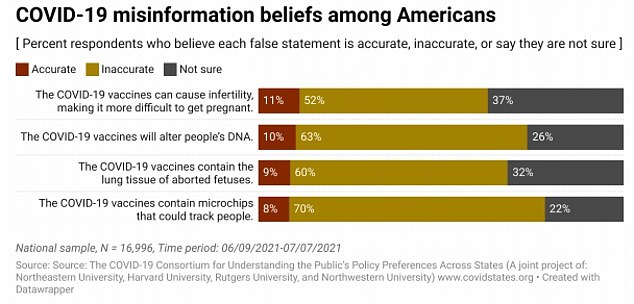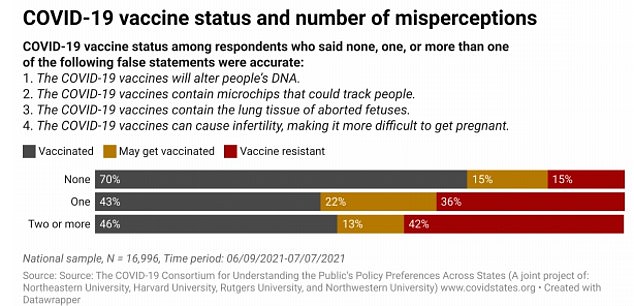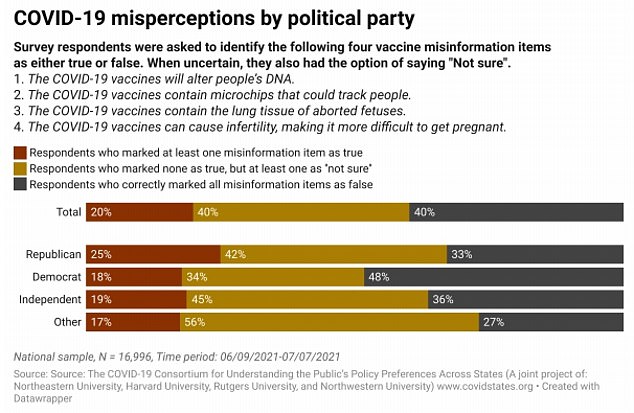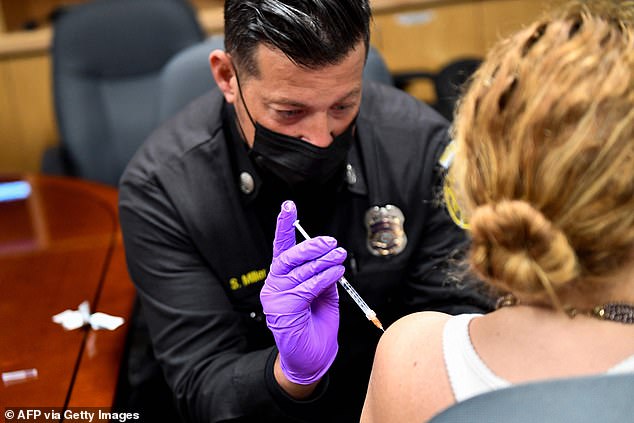One-fifth of Americans believe at least one common piece of misinformation about the COVID-19 vaccines, a new study finds.
Researchers from Harvard University found that many adults in the U.S., vaccinated or not, have fallen prey to lies peddled about vaccines.
The most commonly believed falsehood is that Covid vaccines can cause infertility with more than one-third of those surveyed believe.
Around 10 percent of people believe the shots alter DNA, contain fetus tissue or have microchips.
Vaccine misinformation, particularly on social media, has become a major problem for health officials as they urge Americans to receive the shots.

Harvard researchers found that around 20 percent of people believe at least one piece of common vaccine disinformation

Researchers, whose pre-print study was published on OSF, surveyed nearly 17,000 people for the study.
Each were asked how they felt about four common pieces of misinformation spread about the virus online.
Participants were asked if they believed the lie was accurate, inaccurate or were unsure.
The four statements there were asked about were:
The COVID-19 vaccines can cause infertility, making it more difficult to get pregnantThe COVID-19 vaccines will alter people’s DNAThe COVID-19 vaccines contain the lung tissue of aborted fetusesThe COVID-19 vaccines contain microchips that could track people
For each of them, a majority of people answered that the statement was inaccurate.
The microchip lie was the most deemed inaccurate, with 70 percent of respondents saying it was inaccurate .
Only half, 52 percent, of people called the statement that the vaccines cause infertility inaccurate.
Around one-in-ten people believed each lie was true, though.
The most believed falsehood is that the vaccines cause infertility, at 11 percent.
Ten percent believe the vaccines alter DNA, nine percent believe the vaccines contain fetus tissue and eight percent believe it contains microchips.
In total, around 20 percent of respondents said that they found at least one of the falsehoods correct.
Those most likely to believe at least one misconception were more likely to be male (22 percent) and between age 25 and44 (29 percent).
Asian Americans (16 percent) were less likely than other groups to believe vaccine misinformation, while the other racial groups were nearly even with around 20 percent each believing misinformation.

Males (22%) and people aged 25 to 44 (29%) are most likely to believe vaccine misinformation
Unvaccinated people are more likely to believe the misinformation, which is likely to reason many remain unvaccinated.
Unvaccinated people make up 42 percent of people who believe two or more of the misconceptions, and 36 percent who believe one.
Less than 30 percent of American adults are unvaccinated.
Vaccinated Americans make up more than 70 percent of the American population, but only 46 percent of people believe two or more lies.
While it could easily be assumed that those most likely to believe misconceptions about the vaccine are less educated, that does not appear to be the case.
Americans with graduate degrees are the most likely education group to believe at least one lie about the vaccine, at 26 percent.
People with high incomes, which often correlates with education, are more likely to believe misconceptions as well, with 26 percent of Americans making $100,000 or more per year believing at least one lie.
A quarter of Republicans also believed at least one piece of misinformation, with Democrats, Independents and others falling below 20 percent.

A quarter of Republicans believe at least one piece of vaccine misinformation

People with graduate degrees and those with high incomes are most likely to believe misinformation about the vaccines
Vaccine misinformation has become a huge problem for health officials as they attempt to convince more Americans to get the shots, and it is coming from all kinds of sources.
A recent wave of misinformation has especially cropped up on social media during a recent surge of COVID-19 cases fueled by the Indian ‘Delta’ variant.
Marjorie Taylor Greene, a Republican congresswoman from Georgia, even had her Twitter accounted suspended for a week after she falsely tweeted the vaccines do not work.
‘These vaccines are failing & do not reduce the spread of the virus & neither do masks,’ she wrote in a tweet where she also urged the FDA not to give the vaccines full approval.
The COVID-19 vaccines have proven to be effective against all strains of the virus. While breakthrough infections are possible, they are less likely and often mild cases.

Misinformation about the COVID-19 vaccines has become rampant on social media, though platforms are pushing back against it, hoping to encourage Americans to get the shots. Pictured: A woman receives the COVID-19 vaccine in Culver City, California last week
The misconception that vaccines will alter people’s DNA stems from many misunderstanding the mRNA technology used to create the Pfizer and Moderna vaccines.
Some social media platforms have stepped up their battle against this type of misinformation.
Greene’s suspension is a part of a five-strike program Twitter uses to remove misinformation from the platform.
The recent tweet was Greene’s fourth infraction, and the next will get her permanently removed from Twitter.
Facebook has also removed hundreds of accounts responsible for pushing falsehoods about the vaccines.
Source link : https://www.dailymail.co.uk/health/article-9888585/A-FIFTH-Americans-believe-COVID-19-vaccination-misinformation-including-alters-DNA.html











